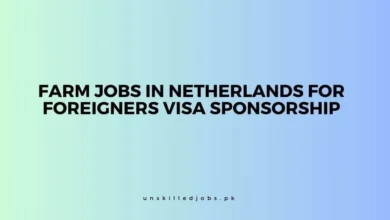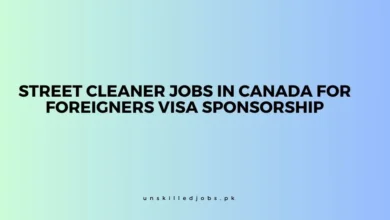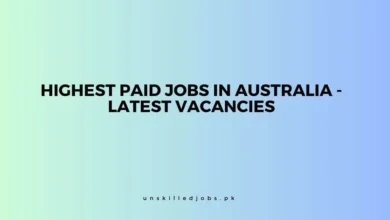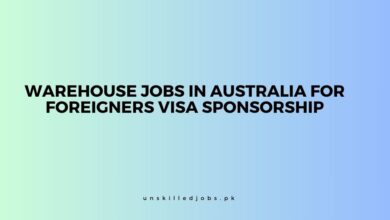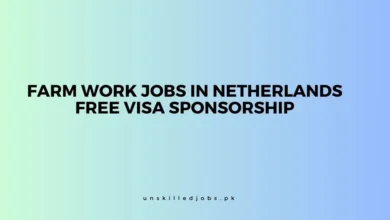South Korean Work Visa for Job Seekers – Application Process
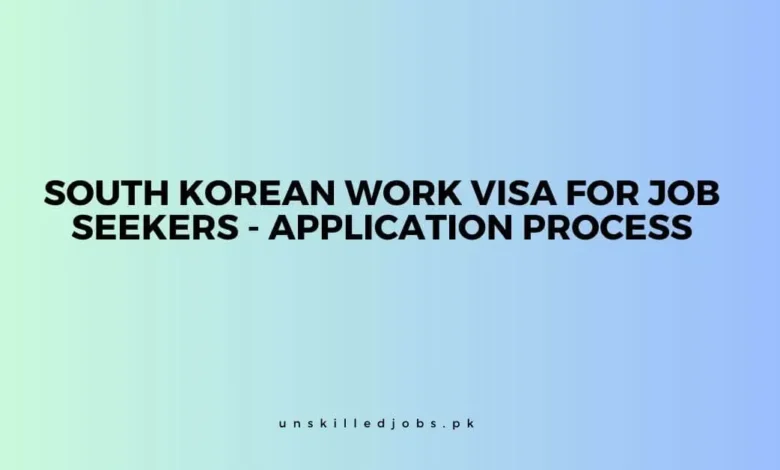
Even though its population is getting older and birth rates are going down, South Korea stands out as a place with lots of opportunities in the world economy. This fast-paced country needs skilled workers right away to fill important gaps in its workforce, especially in technology, healthcare, and industry. This is a once-in-a-lifetime chance for talented people all over the world to build a successful job in one of Asia’s most exciting countries.
Imagine being at the center of groundbreaking technological advances, leading healthcare advances, or playing a key role in South Korea’s booming industries while also immersing yourself in the country’s rich cultural history and current way of life. This guide will show you the best ways to get your dream job in South Korea, the degrees and jobs that are in high demand, and the different types of visas you can get.
Why South Korea Needs You?
South Korea has trouble finding workers because its population is getting older and there aren’t many babies being born. Because of these things, there are big shortages in areas like science, agriculture, and manufacturing. To fill these gaps, the government has raised the number of visas available and is actively encouraging education in areas that are in high demand to bring in talented people from other countries.
Hot Jobs and Degrees in South Korea for 2024
South Korea needs skilled workers in a lot of different areas because its economy is growing and its businesses are driven by innovation. Here are the degrees, jobs, and skills that people want, along with the average salaries for each:
In-Demand Degrees in South Korea are:
Medical and Healthcare
-
- Specializations: Medicine, Nursing, Pharmacology
- Average Salary: 60-90 million KRW ($45,000 – $67,500) annually
- Key Roles: Doctors, Nurses, Pharmacists
STEM Fields (Science, Technology, Engineering, Mathematics)
-
- Specializations: Computer Science, Data Science, Robotics, AI, Cybersecurity
- Average Salary: 70-100 million KRW ($52,500 – $75,000) annually
- Key Roles: Software Developers, Data Scientists, AI Specialists, Cybersecurity Experts
Engineering
-
- Specializations: Electrical, Mechanical, Civil, Software Engineering
- Average Salary: 60-90 million KRW ($45,000 – $67,500) annually
- Key Roles: Electrical Engineers, Mechanical Engineers, Civil Engineers, Software Engineers
High-Demand Professions in South Korea:
IT Professionals
-
- Roles: Software Developers, Data Analysts, Cybersecurity Experts
- Average Salary: 50-80 million KRW ($37,500 – $60,000) annually
Healthcare Professionals
-
- Roles: Doctors, Nurses, Pharmacists
- Average Salary: 60-90 million KRW ($45,000 – $67,500) annually
Engineers
-
- Specializations: Software, Electrical, Mechanical, Civil
- Average Salary: 60-90 million KRW ($45,000 – $67,500) annually
High-Tech Manufacturing Specialists
-
- Roles: Semiconductor Engineers, Robotics Technicians, Process Engineers
- Average Salary: 70-100 million KRW ($52,500 – $75,000) annually
Skill Shortage Trades in South Korea in 2024:
Manufacturing Trades
-
- Roles: Machine Operators, Welders, Assembly Technicians
- Average Salary: 30-50 million KRW ($22,500 – $37,500) annually
Construction Trades
-
- Roles: Carpenters, Electricians, Plumbers, Welders
- Average Salary: 40-60 million KRW ($30,000 – $45,000) annually
Agriculture
-
- Roles: Farm Managers, Agricultural Technicians
- Average Salary: 30-50 million KRW ($22,500 – $37,500) annually
Navigating South Korean Work Visas Types Available in 2024
South Korea has a number of work cards available to skilled foreign workers. Here is a list of the main types and what you need to do to be eligible for each one:
E-7 Visa (Specific Activities)
Subcategories:
-
- E-7-1: For people who have at least a bachelor’s degree and work in areas like medicine, engineering, law, education, and more.
- E-7-2: For people with exceptional skills in the arts, sports, or other specific areas.
- E-7-3: For people who want to invest or start a business that will help the South Korean economy.
- E-7-4: On certain types of visas (E-9, E-10, or H-2) for skilled workers who have lived and worked legally in South Korea for at least four years.
Eligibility:
-
- Job Offer: A job offer from a South Korean company that you can take.
- Qualifications: Education and work skills that are relevant.
- Clean Criminal Record: Must provide a criminal background check.
- Health Check: Must undergo a medical examination.
D-8 Visa (Corporate Investment)
Eligibility:
- Relevant Field: The business must be in an area where there aren’t enough skilled workers.
- Investment: Putting at least USD 70,000 into a South Korean business.
- Active Participation: Has to take an active role in running the business.
D-9 Visa (Trade Management)
Eligibility: Trade Managers: This section is for foreign trade managers who work for a Korean trading company or who want to start their own trading company in South Korea.
Read Also: Unskilled Jobs in South Korea with Visa Sponsorship
F-2 Visa (Residence)
Subcategory: F-2-7: Points-based system for skilled workers.
Eligibility: Points System: You get points based on your age, schooling, work experience, and how well you speak Korean. To qualify, you need to get a certain number of points.
F-4 Visa (Overseas Koreans)
Eligibility: Ethnic Koreans: For ethnic Koreans (including those with foreign nationality) who can show Korean language proficiency or have specific skills.
Essential Requirements for All South Korean Work Visas in 2024
- Job Offer: Usually, you need a job offer from a South Korean company.
- Qualifications: Must meet the exact requirements for education and work experience for their visa category.
- Criminal Background Check: Must provide a clean criminal record.
- Health Check: Must pass a medical examination.
- Language Proficiency: For some types of visas, you may need to be able to speak and understand Korean, but it’s not always necessary.
Finding Your Dream Job in South Korea on Job Seeker VISA
South Korea’s economy needs people with skills like yours, whether you are an engineer, work in healthcare, IT, or trades. Start your job search here:
List of New South Korean Government Job Portals
- WorkNet (워크넷): The official job portal of the Korean Ministry of Employment and Labor, featuring a wide range of job listings.
- Seoul Global Center: Offers comprehensive support for foreign residents in Seoul, including job listings and career counseling.
- Saramin (사람인): Another major job portal featuring numerous job openings for both local and international applicants.
Top Recruitment Agencies in South Korea for Skill Shortage Jobs
- Robert Walters Korea (https://www.robertwalters.co.kr/en/): Specializes in finance, technology, engineering, and more, known for matching candidates with top-tier companies.
- Michael Page Korea (https://www.michaelpage.com.hk/jobs/korea): Provides services across diverse industries such as healthcare, manufacturing, and IT.
- PeopleNJob (https://www.peoplenjob.com/): Connects English-speaking professionals with job opportunities in South Korea.
- Korea JAC Recruit (https://www.jacgroup.com/en/locations/country/korea): Offers job opportunities in various sectors, including IT, manufacturing, and services.
- HR Korea (https://www.hrdkorea.or.kr/ENG): Recruits foreign talent for Korean companies, providing job placement and visa application assistance.
Conclusion:
Korea has a lot of job chances for skilled foreign workers, even though its population is getting older and there aren’t many babies being born. Right now is a great time to think about moving to South Korea to build a successful career. There is a high demand for people with skills in technology, healthcare, and engineering, and there are many visa choices to make the move easier. South Korea is a great place to work if you want to work in cutting-edge technology, important healthcare, or strong engineering fields. The country is always changing and is full of culture and new ideas. Start your search for your dream job in this exciting country today by looking at job boards and getting in touch with top staffing firms.
Frequently Asked Questions
-
Why is South Korea an attractive destination for skilled workers?
South Korea has a lot of possibilities because it has an advanced economy and industries that are driven by new ideas. The country is constantly looking for skilled workers to fill open positions in technology, healthcare, and engineering. This makes it a great place for talented people from other countries to come work.
-
What types of work visas are available for skilled workers in South Korea?
Key work visas include the E-7 Visa (Specific Activities), D-8 Visa (Corporate Investment), D-9 Visa (Trade Management), F-2 Visa (Residence), and F-4 Visa (Overseas Koreans). Each visa has specific eligibility criteria based on job offers, qualifications, investment, and more.

